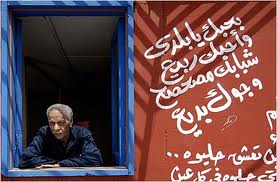Den första egyptiska tecknade filmen från 1937
Omar Khayyam
Egyptens Bellman

tilldelades i år Prins Claus stora Pris (läs nedan utdrag från deras hemsida).

Utdrag ur http://www.princeclausfund.org/en/programmes/awards
Ahmed Fouad Negm is a master poet, fearless social and political critic, and beloved advocate of the poor and the disenfranchised. Rooted in local working class culture, he has been a perceptive public intellectual and a much-loved balladeer of the people for many decades. Negm is both an icon and a folk hero, renowned in literary circles for the quality, lyricism and beauty of his work, from love songs to radical satires that take the complex, highly nuanced vernacular Arabic to unprecedented poetic levels. He is celebrated on the streets of Cairo and across the Arab world for giving voice to the spirit of the people’s movement for social justice.
Negm draws creatively on the rich colloquial language, its rhythms and traditions of song, invocation and especially humour, to give vibrant expression to the people’s concerns and aspirations. Since the 1960s, he has criticised the succession of authoritarian regimes and elites in Egypt – from British colonial times onwards – exposing their willingness to oppress and impoverish people, their abuse of power, their self-serving deceptions, hypocrisies and corruption. Achieving this through hilarious caricatures, double meanings, reworked slogans, satiric mimicry and devastating irony, Negm uplifts, encourages and inspires people, keeping hope alive in the face of tyranny.
Liberal and open-minded, Negm reminds his audiences of Egypt’s heritage of ethnic and religious diversity, its deep pluralist and humanist roots and universal values of mutual co-existence and social solidarity. In the 1970s and 80s, when such public performances were outlawed, Negm's charismatic underground performances with legendary musician Sheik Imam were well attended despite great personal risk. Combining poetry and music in this traditional form, Negm spread his message to the widest possible audience including the illiterate and reached populations across the Middle East through samizdat cassette tapes. And today his stirring message is still highly relevant – many young Egyptians know his poems by heart, chant them on the streets, use them in graffiti and posters, and reinterpret them in new music.
Ahmed Fouad Negm is honoured for creating true poetry in vernacular Arabic that communicates deeply with people; for his independence, unwavering integrity, courage and rigorous commitment to the struggle for freedom and justice; for speaking truth to power, refusing to be silenced and inspiring more than three generations in the Arab-speaking world; for the aesthetic and political force of his work highlighting the basic need for culture and humour in harsh and difficult circumstances; and for his significant impact on Arabic poetry bringing recognition to the rich literary potential of the colloquial language.

